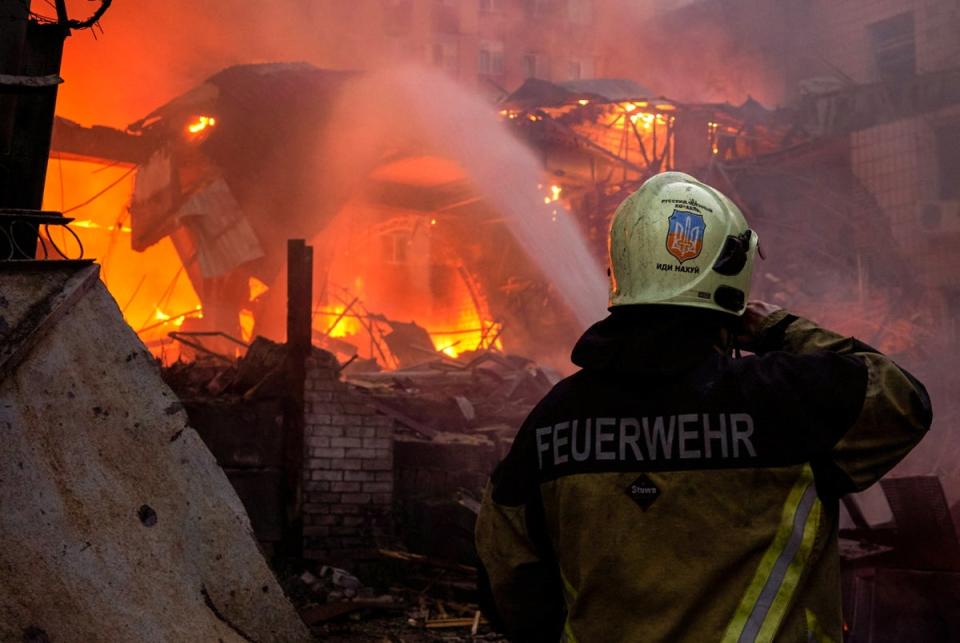Ukraine launches ‘massive’ drone strikes on six regions of Russia – destroying war planes
Ukrainian drones have hit at least six regions deep inside Russia – including destroying war planes at an airfield – in one of the largest such strikes since the start of Moscow's invasion.
Russian officials described attacks on targets in the Pskov, Bryansk, Kaluga, Orlov, Ryazan and Moscow regions, with the assault on the military airfield in Pskov the most significant. Situated more than 400 miles (600 kilometres) from Ukraine, it was where a number of elite paratroopers are stationed. The state-run Tass news agency reported at least four giant Il-76 transport planes were damaged, two of which had "burst into flames".
the governor of Pskov posted video on the messaging app Telegram showing a huge fire with the sounds of sirens and an explosion at the air base. Other videos posted online showed anti-aircraft systems in action around the city, which is about 20 miles east of Russia's border with Nato-member Estonia.
Kyiv confirmed the Russian planes had been destroyed in Pskov, without commenting on the nature of the incident. It generally does not claim strikes on Russian territory, but does say it has the right to hit military targets.
"Yes, four IL-76 transport planes were destroyed in Pskov at an airfield, they are beyond repair. Also, several other of those [aircraft] are damaged, but the information is being checked," Andriy Yusov, a spokesman for Ukraine's military intelligence agency.
The number of drone strikes hitting Russia has increased in recent weeks, supporting a ground counteroffensive against Russian forces in Ukraine by destroying equipment and seeking to disrupt supply lines. Moscow typically describes all Ukrainian drone strikes as unsuccessful, regardless of the damage on the ground, but claimed that its own forces had attacked four Ukrainian attack boats in the Black Sea.
In a sign of how disruptive the latest Ukrainian strikes were, Russia's Defence Ministry said they "would not go unpunished". Kremlin spokesman Dmitry Peskov also said Russia was working out where the drones were launched from to try and prevent further strikes. President Vladimir Putin had been informed immediately, as would be the case in any such "massive attacks", Mr Peskov said.

The increase in strikes inside Russia, including repeated drone strikes on central Moscow, have brought the war home to many Russians for the first time, even as Ukrainians have spent the past 18 months under threat of air strikes from long-range missiles and drones.
The latest strikes inside Russia coincided with Moscow's largest barrage against Kyiv in months. Ukraine said its air defences had shot down 28 Russian missiles and 15 out of 16 drones fired overnight.
"Kyiv has not experienced such a powerful attack since spring. The enemy launched a massive, combined attack using drones and missiles," Serhiy Popko, the head of the city's military administration, said on Telegram.
Back in Moscow, the Kremlin said that it will not conduct an investigation into plane crash that killed the Wagner mercenary group founder, Yevgeny Prigozhin, under international rules. "In this case there can be no talk of any international aspect," the Kremlin spokesman, Mr Peskov said, but he did suggest that "deliberate wrongdoing" is among the possible causes.
The private Embraer jet on which Mr Prigozhin was travelling to St Petersburg from Moscow crashed north of Moscow killing all 10 people on board on 23 August, including two other top Wagner figures, Mr Prigozhin's four bodyguards and a crew of three. That was two months to the day since Mr Prigozhin began a mutiny against Russian President Vladimir, with his forces marching towards Moscow. The uprising ended 24 hours later after a deal was struck between the Wagner founder and the Kremlin – but a number of Western leaders have suggested that Mr Putin would not let that embarrassment stand. The Kremlin has claimed any suggestion the Russian leader was involving in the killing is an "absolute lie".
Reuters and Associated Press contributed to this report


